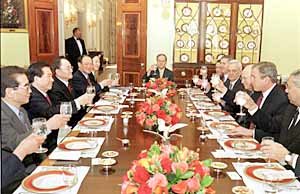Perception gap remains at Washington summit
Perception gap remains at Washington summit
Posted March. 09, 2001 13:23,

The Washington summit of President Kim Dae-Jung and U.S. President George W. Bush produced a broad agreement in support of South Korea`s policy of engagement and bilateral cooperation with North Korea. But the outcome also highlighted the differences on some points at issue. The Seoul government said there was no disagreement but the depth of accord and shared perceptions declined substantially from the Clinton years. What was the cause of the discord and how does the Seoul government explain it? :--Ed.
It seems to originate from the fact that the Bush administration has yet to forge a clear policy on North Korea. Inconsistent remarks by U.S. government leaders during the summit testified to this fact. On Mar. 6, just prior to the summit, Secretary of State Colin Powell said the United States would pick up where the Clinton administration left off in seeking fresh contacts with Pyongyang. His remarks were construed as a signal of Washington`s active interest in restarting negotiations with North Korea for a deal on the North Korean missile program that the Clinton administration came close to sealing.
The next day, however, Powell slightly revised his stance, saying, ``President Bush understands the nature of the Pyongyang regime and won`t be fooled by the nature of that regime; the president forcefully made the point that we are undertaking a full review of our relationship (with North Korea).``
Seoul and Washington`s divergent readings of the signs of change in North Korea are the source of their differing perceptions. Kim said that North Korea is moving toward reform and wider opening to the outside world and is seeking better relations with the United States for the sake of security and economic prosperity. Bush said Pyongyang needed to show positive signs of change, implying that North Korea should take concrete steps to end its missile program, reduce conventional forces and pull back its forward-deployed troops.
Local observers said that since the Republican administration in the U.S. prefers a foreign policy based on strength, it has no choice but to be tough on North Korea and thus take a more hardline stance than Seoul.
If the Bush administration adopted the Clinton administration`s softer line, it would actually be rather surprising, one analyst said.
Others read some political aims into the differing perceptions. Washington intends to use its North Korea policy as leverage to extract increased concessions from Seoul on arms sale and the construction of a national missile defense system, one observer speculated. Government officials here deny any such intentions on the part of the United States. Yet, the talk of Washington`s hard-sell approach to winning the contract for South Korea`s FX program, aimed at purchasing 4.3 trillion won worth of fighter planes, lends some credence to this theory. Washington is also in need of greater support from Seoul in the promotion of its missile shield program.
Headline News
- Joint investigation headquarters asks Yoon to appear at the investigation office
- KDIC colonel: Cable ties and hoods to control NEC staff were prepared
- Results of real estate development diverged by accessibility to Gangnam
- New budget proposal reflecting Trump’s demand rejected
- Son Heung-min scores winning corner kick







